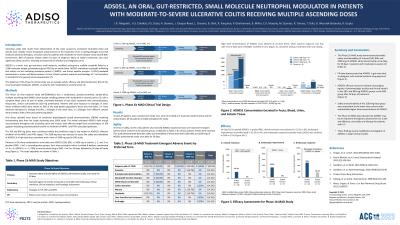Sunday Poster Session
Category: Colon
P0172 - ADS051, an Oral, Gut-Restricted, Small Molecule Neutrophil Modulator in Patients With Moderate-To-Severe Ulcerative Colitis: Results From a Multiple Ascending Dose Study
Sunday, October 22, 2023
3:30 PM - 7:00 PM PT
Location: Exhibit Hall

Has Audio

Jessica R. Allegretti, MD, MPH
Brigham and Women's Hospital, Harvard Medical School
Boston, MA
Presenting Author(s)
Award: Presidential Poster Award
Jessica R.. Allegretti, MD, MPH1, Adam S. Cheifetz, MD2, Parambir S. Dulai, MD3, AC Stevens, MD4, Jillian Chapas-Reed, MS5, Laurent Chesnel, PhD5, Bharat Dixit, PhD5, Ronald Farquhar, BSc, DPhil5, Parviz Ghahramani, MBA, PharmD, PhD6, Benjamin W. Miller, PhD5, Christopher K.. Murphy, PhD5, Megan Quintas, BS5, Raisa Tanase, MD7, Tengiz Telia, MD8, Barbara Wozniak-Stolarska, MD9, Renu Gupta, MD5
1Brigham and Women's Hospital, Harvard Medical School, Boston, MA; 2Beth Israel Deaconess Medical Center, Center for Inflammatory Bowel Disease, Boston, MA; 3Feinberg School of Medicine, Northwestern University, Chicago, IL; 4Independent Biopharmaceutical Consultant, Boston, MA; 5Adiso Therapeutics, Inc., Concord, MA; 6Inncelerex, Jersey City, NJ; 7ARENSIA Exploratory Medicine, Republican Clinical Hospital, Chisinau, Chisinau, Moldova; 8American Hospital Tbilisi, Tbilisi, T'bilisi, Georgia; 9PlanetMed Gastroenterology Sp. z o.o., Wrocław, Dolnoslaskie, Poland
Introduction: Ulcerative colitis (UC) is characterized by inflammation of the colon, with neutrophils playing a key role in disease activity, prognosis, and response to therapies. Though several therapeutics are available for the treatment of UC, they have limited efficacy and potential for significant side effects. Substantial unmet need remains for effective and safe therapies. ADS051 is a novel, oral, gut-restricted small molecule derived from a cyclosporine A scaffold. It is designed to inhibit both MRP2-driven neutrophil migration into the colon and FPR1-mediated neutrophil activation and lacks T-cell immunosuppression. Study NCT05084261 evaluated the safety, efficacy, and pharmacokinetics (PK) of ADS051 in patients with moderate to severe UC.
Methods: This multiple-ascending-dose, randomized, placebo-controlled, double-blind, multicenter study enrolled patients with a complete Mayo score ≥6 and on stable treatment with aminosalicylates, thiopurines, and/or corticosteroids. Patients received oral ADS051 or placebo (3:1) once daily for 28 days (dose cohorts: 200 mg, 800 mg, and 3200 mg) followed by 30 days off study drug. The primary outcome was safety and tolerability of ADS051, with secondary efficacy endpoints at Day 28 of clinical remission, endoscopic response, and histologic remission. Weekly assessments of PK, disease activity, and fecal calprotectin were performed. Safety was evaluated throughout the study. Endoscopy was performed at screening and Day 28.
Results: All 24 patients enrolled completed the study (8/cohort); 16.7% of patients on ADS051 vs 66.7% on placebo had at least 1 treatment-emergent adverse event (TEAE). No serious adverse events were reported. No TEAE resulted in dose modification or drug discontinuation. Concentrations of ADS051 achieved in stool were greater than IC50 for MRP2 and FPR1 targets at all dose levels. There was low systemic exposure, with < 1% of daily ADS051 dose excreted in urine. For pooled ADS051 and pooled placebo, clinical remission was achieved in 22% ADS051 vs 0% placebo at Day 28, and endoscopic response was achieved in 50% ADS051 vs 16.7% placebo at Day 28. Of the 4 patients on ADS051 with clinical remission, 3 achieved histologic remission.
Discussion: This Phase 1 study of ADS051, a novel, oral, gut-restricted neutrophil modulator, demonstrated favorable safety and tolerability with signals of pharmacologic activity, warranting additional investigation in larger studies.
Disclosures:
Jessica R.. Allegretti, MD, MPH1, Adam S. Cheifetz, MD2, Parambir S. Dulai, MD3, AC Stevens, MD4, Jillian Chapas-Reed, MS5, Laurent Chesnel, PhD5, Bharat Dixit, PhD5, Ronald Farquhar, BSc, DPhil5, Parviz Ghahramani, MBA, PharmD, PhD6, Benjamin W. Miller, PhD5, Christopher K.. Murphy, PhD5, Megan Quintas, BS5, Raisa Tanase, MD7, Tengiz Telia, MD8, Barbara Wozniak-Stolarska, MD9, Renu Gupta, MD5. P0172 - ADS051, an Oral, Gut-Restricted, Small Molecule Neutrophil Modulator in Patients With Moderate-To-Severe Ulcerative Colitis: Results From a Multiple Ascending Dose Study, ACG 2023 Annual Scientific Meeting Abstracts. Vancouver, BC, Canada: American College of Gastroenterology.
Jessica R.. Allegretti, MD, MPH1, Adam S. Cheifetz, MD2, Parambir S. Dulai, MD3, AC Stevens, MD4, Jillian Chapas-Reed, MS5, Laurent Chesnel, PhD5, Bharat Dixit, PhD5, Ronald Farquhar, BSc, DPhil5, Parviz Ghahramani, MBA, PharmD, PhD6, Benjamin W. Miller, PhD5, Christopher K.. Murphy, PhD5, Megan Quintas, BS5, Raisa Tanase, MD7, Tengiz Telia, MD8, Barbara Wozniak-Stolarska, MD9, Renu Gupta, MD5
1Brigham and Women's Hospital, Harvard Medical School, Boston, MA; 2Beth Israel Deaconess Medical Center, Center for Inflammatory Bowel Disease, Boston, MA; 3Feinberg School of Medicine, Northwestern University, Chicago, IL; 4Independent Biopharmaceutical Consultant, Boston, MA; 5Adiso Therapeutics, Inc., Concord, MA; 6Inncelerex, Jersey City, NJ; 7ARENSIA Exploratory Medicine, Republican Clinical Hospital, Chisinau, Chisinau, Moldova; 8American Hospital Tbilisi, Tbilisi, T'bilisi, Georgia; 9PlanetMed Gastroenterology Sp. z o.o., Wrocław, Dolnoslaskie, Poland
Introduction: Ulcerative colitis (UC) is characterized by inflammation of the colon, with neutrophils playing a key role in disease activity, prognosis, and response to therapies. Though several therapeutics are available for the treatment of UC, they have limited efficacy and potential for significant side effects. Substantial unmet need remains for effective and safe therapies. ADS051 is a novel, oral, gut-restricted small molecule derived from a cyclosporine A scaffold. It is designed to inhibit both MRP2-driven neutrophil migration into the colon and FPR1-mediated neutrophil activation and lacks T-cell immunosuppression. Study NCT05084261 evaluated the safety, efficacy, and pharmacokinetics (PK) of ADS051 in patients with moderate to severe UC.
Methods: This multiple-ascending-dose, randomized, placebo-controlled, double-blind, multicenter study enrolled patients with a complete Mayo score ≥6 and on stable treatment with aminosalicylates, thiopurines, and/or corticosteroids. Patients received oral ADS051 or placebo (3:1) once daily for 28 days (dose cohorts: 200 mg, 800 mg, and 3200 mg) followed by 30 days off study drug. The primary outcome was safety and tolerability of ADS051, with secondary efficacy endpoints at Day 28 of clinical remission, endoscopic response, and histologic remission. Weekly assessments of PK, disease activity, and fecal calprotectin were performed. Safety was evaluated throughout the study. Endoscopy was performed at screening and Day 28.
Results: All 24 patients enrolled completed the study (8/cohort); 16.7% of patients on ADS051 vs 66.7% on placebo had at least 1 treatment-emergent adverse event (TEAE). No serious adverse events were reported. No TEAE resulted in dose modification or drug discontinuation. Concentrations of ADS051 achieved in stool were greater than IC50 for MRP2 and FPR1 targets at all dose levels. There was low systemic exposure, with < 1% of daily ADS051 dose excreted in urine. For pooled ADS051 and pooled placebo, clinical remission was achieved in 22% ADS051 vs 0% placebo at Day 28, and endoscopic response was achieved in 50% ADS051 vs 16.7% placebo at Day 28. Of the 4 patients on ADS051 with clinical remission, 3 achieved histologic remission.
Discussion: This Phase 1 study of ADS051, a novel, oral, gut-restricted neutrophil modulator, demonstrated favorable safety and tolerability with signals of pharmacologic activity, warranting additional investigation in larger studies.
Disclosures:
Jessica Allegretti: Abbvie – Consultant, Speakers Bureau. Adiso Therapeutics – Consultant. Artizan – Consultant. Artugen Therapeutics – Consultant. Baccain – Consultant. Bristol-Myers Squibb/Celgene – Consultant, Speakers Bureau. Ferring Pharmaceuticals – Consultant. Finch Therapeutics – Consultant. Iterative Scopes – Consultant. Janssen – Consultant, Grant/Research Support, Speakers Bureau. Merck – Consultant, Grant/Research Support. Morphic – Consultant. Pandion Therapeutics – Consultant. Pfizer – Consultant, Grant/Research Support. Roivant Sciences – Consultant. Seres Therapeutics – Consultant. Servatus – Consultant. Summit – Consultant.
Adam S. Cheifetz: Abbvie – Consultant. Artizan – Consultant. Artugen – Consultant. BMS – Consultant. Clario – Consultant. Equillium – Consultant. Food Is Good – Consultant. Fresenius Kabi – Consultant. Fzata – Consultant. Janssen – Consultant. Pfizer – Consultant. Procise – Consultant. Prometheus – Consultant. Protagonist – Consultant. Samsung – Consultant. Spherix – Consultant. Takeda – Consultant.
Parambir S. Dulai: Abbvie – Consultant. Abivax – Consultant. Adiso Therapeutics, Inc – Consultant. Bristol Myers Squibb – Consultant, Grant/Research Support. GlaxoSmithKline – Consultant. Janssen – Consultant, Grant/Research Support. Lilly – Consultant. Pfizer – Consultant, Grant/Research Support. PreciDiag – Royalties. Roivant – Consultant. Takeda – Consultant, Grant/Research Support.
AC Stevens: Artugen – Consultant. Astria Therapeutics – Consultant. Bacainn – Consultant. ClearB Therapeutics – Consultant. Surrozen – Consultant.
Jillian Chapas-Reed: Adiso Therapeutics, Inc – Employee.
Laurent Chesnel: Adiso Therapeutics, Inc. – Employee.
Bharat Dixit: Adiso Therapeutics, Inc – Employee.
Ronald Farquhar: Adiso Therapeutics, Inc – Stock-privately held company. Bacainn – Advisory Committee/Board Member, Employee, Intellectual Property/Patents.
Parviz Ghahramani: Adiso Therapeutics, Inc – Consultant.
Benjamin W. Miller: Adiso Therapeutics, Inc – Former employee. Ipsen – Employee.
Christopher Murphy: Adiso Therapeutics, Inc – Employee, Intellectual Property/Patents, Stock Options.
Megan Quintas: Adiso Therapeutics, Inc. – Employee.
Raisa Tanase indicated no relevant financial relationships.
Tengiz Telia indicated no relevant financial relationships.
Barbara Wozniak-Stolarska indicated no relevant financial relationships.
Renu Gupta: Adiso Therapeutics, Inc. – Employee.
Jessica R.. Allegretti, MD, MPH1, Adam S. Cheifetz, MD2, Parambir S. Dulai, MD3, AC Stevens, MD4, Jillian Chapas-Reed, MS5, Laurent Chesnel, PhD5, Bharat Dixit, PhD5, Ronald Farquhar, BSc, DPhil5, Parviz Ghahramani, MBA, PharmD, PhD6, Benjamin W. Miller, PhD5, Christopher K.. Murphy, PhD5, Megan Quintas, BS5, Raisa Tanase, MD7, Tengiz Telia, MD8, Barbara Wozniak-Stolarska, MD9, Renu Gupta, MD5. P0172 - ADS051, an Oral, Gut-Restricted, Small Molecule Neutrophil Modulator in Patients With Moderate-To-Severe Ulcerative Colitis: Results From a Multiple Ascending Dose Study, ACG 2023 Annual Scientific Meeting Abstracts. Vancouver, BC, Canada: American College of Gastroenterology.

